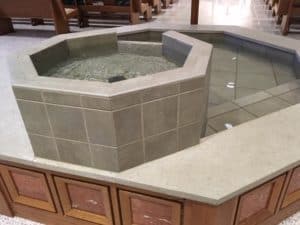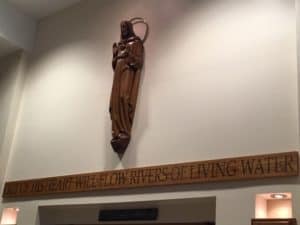As we walk with the Lord on the Twenty-ninth Sunday of Ordinary Time, we share a Franciscan Gospel reflection and questions written by Fr. Paul Gallagher, OFM. They are edited by Franciscan Sister of Christian Charity Sister Anne Marie Lom and Joe Thiel. The excerpts from the Sunday readings are prepared by Joe Thiel. To read or download the complete pdf with excerpts for your prayer, please click here: Franciscan Gospel Reflection October 21 2018. Excerpts from the Lectionary for Mass for Use in the Dioceses of the United States of America, second typical edition © 2001, 1998, 1997, 1986, 1970 Confraternity of Christian Doctrine, Inc., Washington, DC. Used with permission. All rights reserved. No portion of this text may be reproduced by any means without permission in writing from the copyright owner. Please include this information when printing.
Photos: Sacred Heart of Jesus Church, St. Francis, Wisconsin
Mark 10:35-45
Then James and John, the sons of Zebedee, came to him and said to him, “Teacher, we want you to do for us whatever we ask of you.” He replied, “What do you wish me to do for you?” They answered him, “Grant that in your glory we may sit one at your right and the other at your left.” Jesus said to them, “You do not know what you are asking. Can you drink the cup that I drink or be baptized with the baptism with which I am baptized?” They said to him, “We can.” Jesus said to them, “The cup that I drink, you will drink, and with the baptism with which I am baptized, you will be baptized; but to sit at my right or at my left is not mine to give but is for those for whom it has been prepared.”
When the ten heard this, they became indignant at James and John. Jesus summoned them and said to them, “You know that those who are recognized as rulers over the Gentiles lord it over them, and their great ones make their authority over them felt. But it shall not be so among you. Rather, whoever wishes to be great among you will be your servant; whoever wishes to be first among you will be the slave of all. For the Son of Man did not come to be served but to serve and to give his life as a ransom for many.”
Background
Last week’s gospel ends with Jesus reassuring Peter and the disciples that “there is no one who has given up house or brothers or sisters or mother or father or children or lands for my sake and for the sake of the gospel who will not receive a hundred times more now in this present age: houses and brothers and sisters and mothers and children and lands, with persecutions, and eternal life in the age to come.” (Mark 10:30) Mark then describes Jesus addressing the disciples for a third time about the events that await him as he makes his way to Jerusalem. “Behold, we are going up to Jerusalem, and the Son of Man will be handed over to the chief priests and the scribes, and they will condemn him to death and hand him over to the Gentiles who will mock him, spit upon him, scourge him, and put him to death, but after three days he will rise.” (Mark 10:33-34) This is Jesus’ clearest statement yet of his impending passion, death and resurrection. The contrast between what Jesus foresees as his immediate future and what James and John seem to anticipate draws more attention to Jesus’ prediction.
One of the things Mark is doing, by placing the request of James and John immediately after Jesus’ most explicit prediction of his rejection, cross, and resurrection, is to demonstrate to Mark’s community the true nature of discipleship. Mark often portrays the disciples as facing the same issues that his early community is dealing with.
In the text, James and John ask Jesus for positions that would signify authority within the realm of power and glory. The other disciples seem to be upset with what James and John have done. But this is not because they have totally misunderstood what Jesus has been trying to teach them, or because they are embarrassed for them. James and John have requested what the others, themselves included, were hoping Jesus might bestow on them. Jesus’ question to them, about whether or not they were ready to accept both the baptism and the cup that he will drink, freely makes use of a familiar custom in their culture. It was the patriarch of each family who poured the cups at each family meal. Those attending the meal were expected to accept without question whatever was given to them. Here Mark is reminding his community that they, too, have been baptized into the life of Christ, and they are receiving from the cup at their weekly celebration of the Lord’s Supper. They, like the disciples, have chosen to be Jesus’ disciples, and as Jesus accepts the cup that has been poured out for him by his Father, they too must accept in faith what God prepared for each of them. In the Gospel, Mark records how Jesus gathers all of the disciples and reminds them that greatness, in his realm, comes not from positions of authority but from taking on positions of service.
Reflection Questions
1. What are some ways that you hope that you stand out from others?
2. At this point in your life what are some ways you hope for success?
3. When you hear James and John ask Jesus, when you come into your glory can we sit at your right and left…
4. Jesus asks James and John if they can drink the cup that he will drink or be baptized in the baptism that he will be baptized. They respond that they can. If Jesus asked that same question of you, what would you like to respond?
5. Do you ever become indignant at the claims and/or actions of others?
6. Can you talk to God about your own hopes for that time when you come into the presence of God’s glory, or about your own hope to be a faithful disciple, or about your feelings toward those who seem to make their greatness felt?




